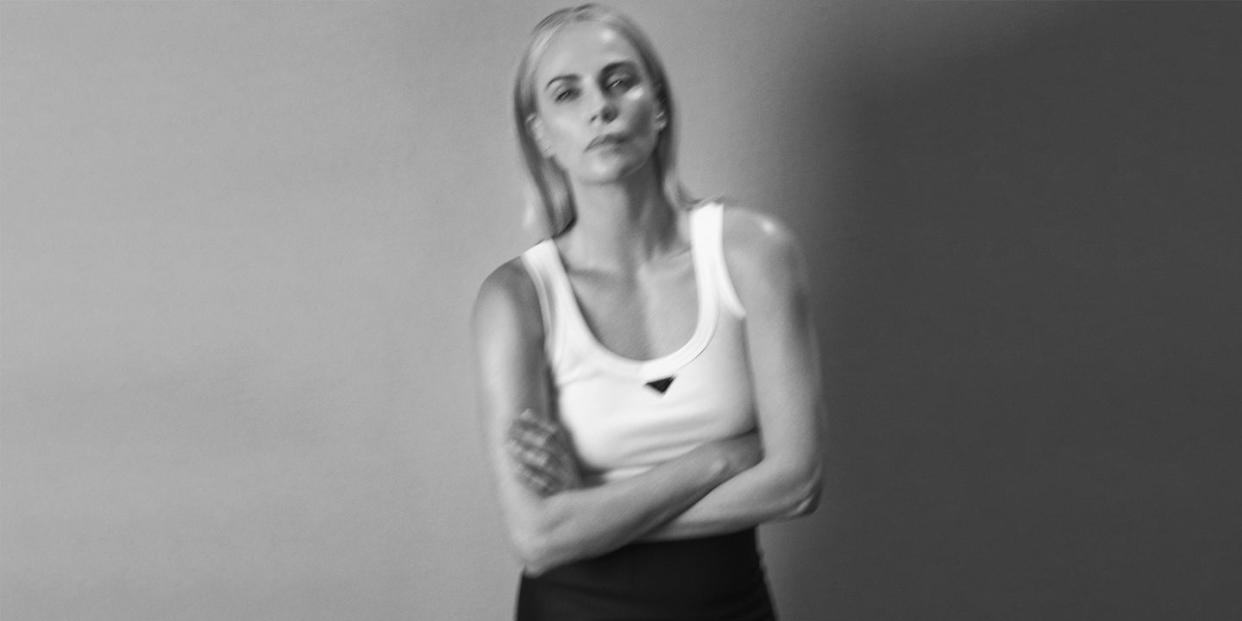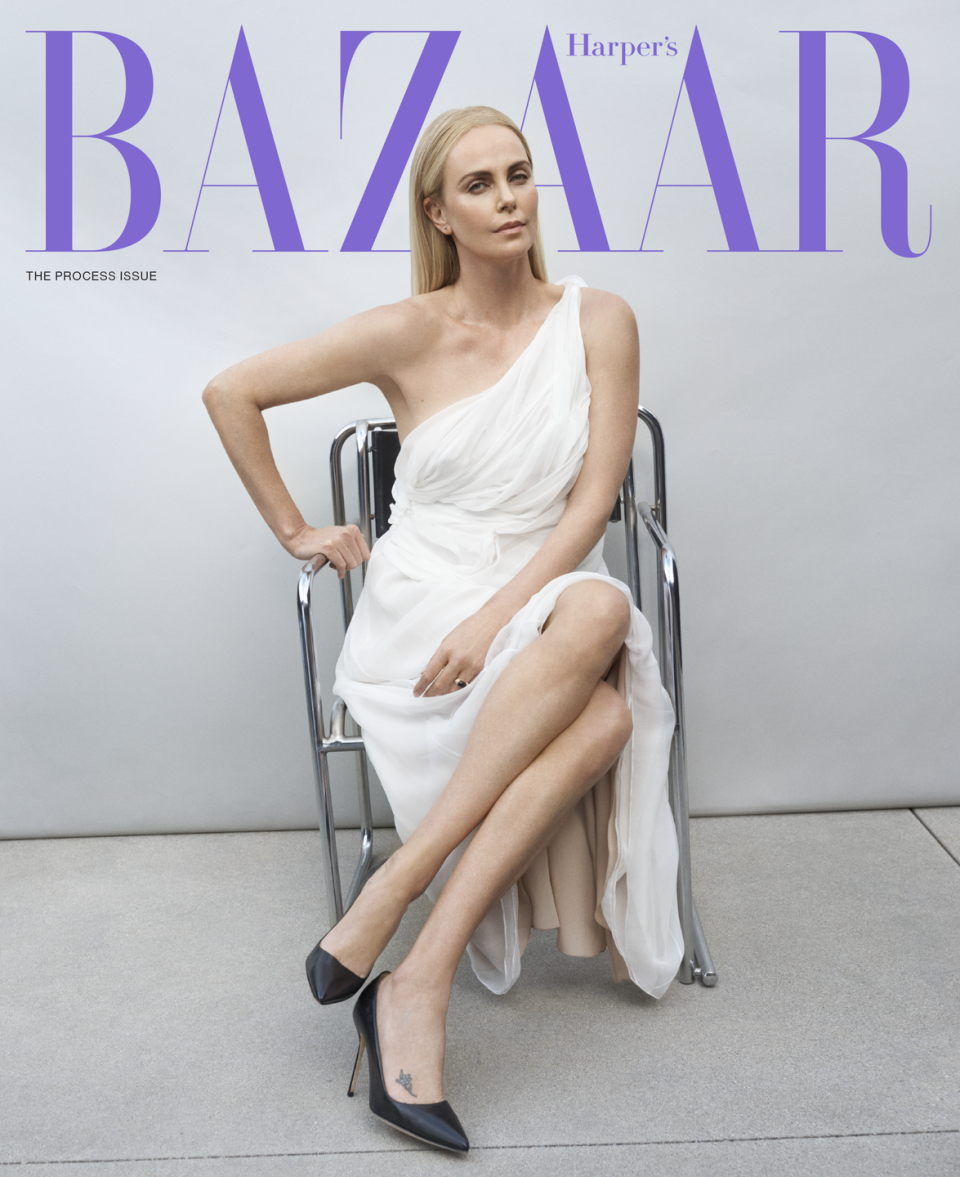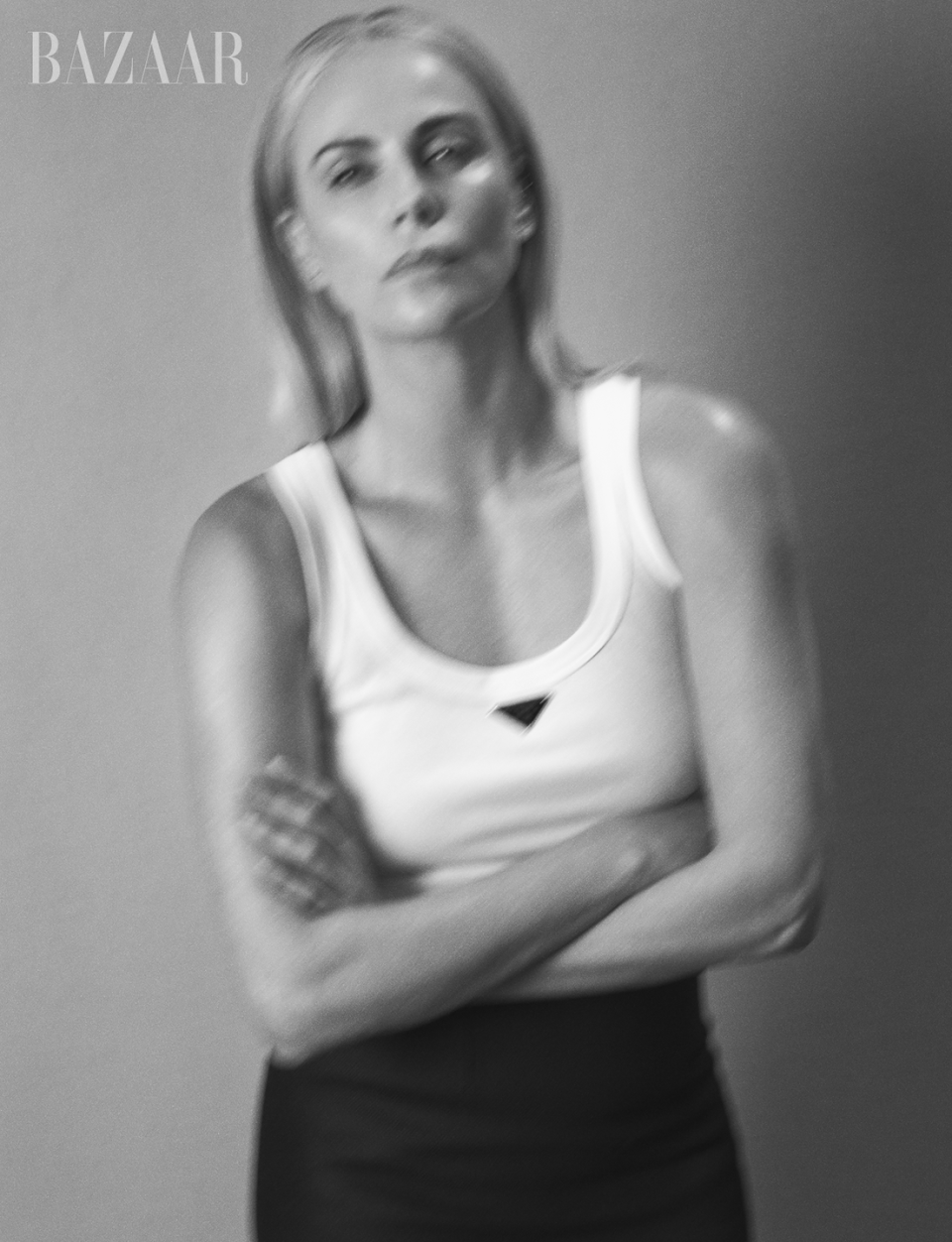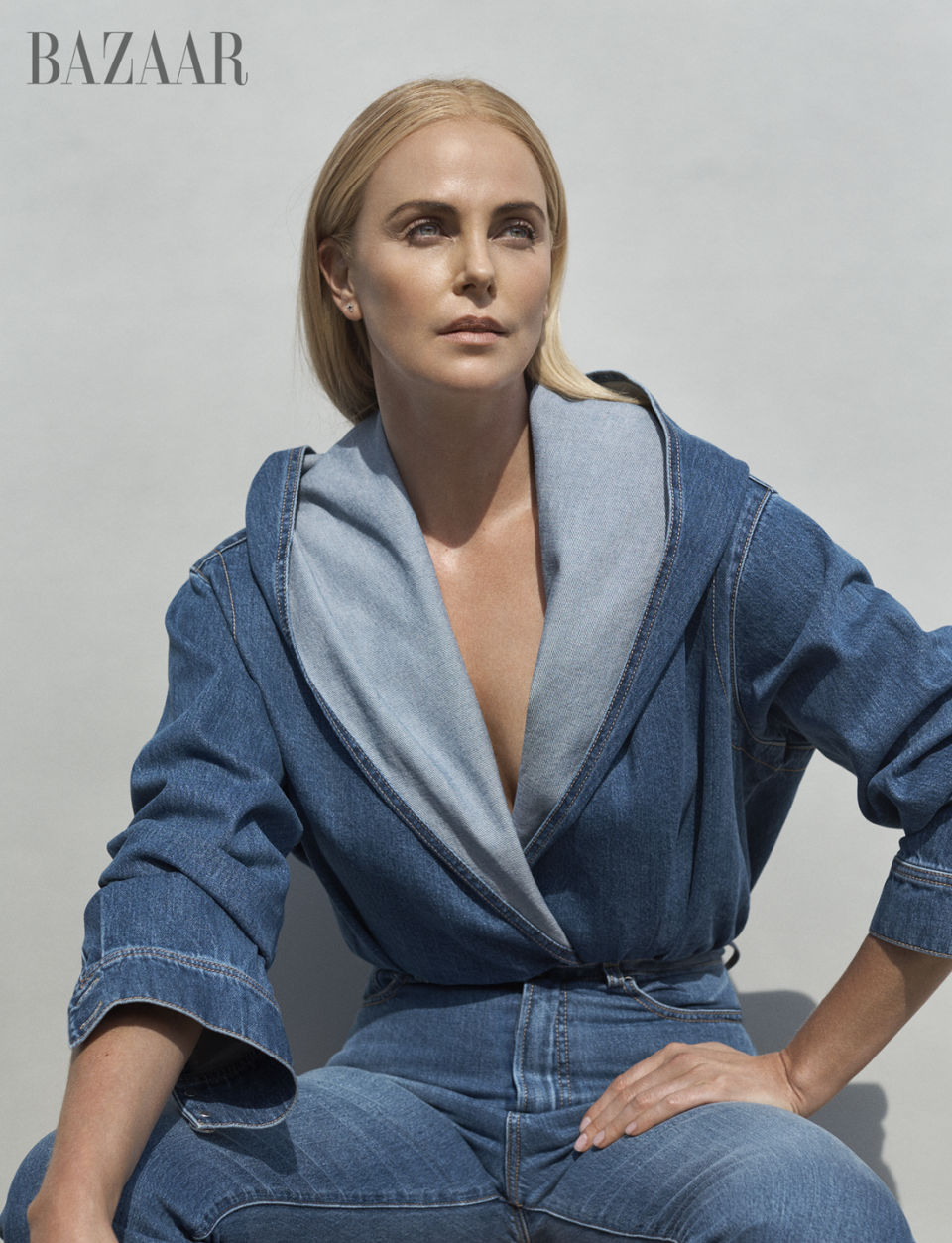Charlize Theron Still Loves Hollywood. She Just Wants It To Be Better.

- Oops!Something went wrong.Please try again later.

Charlize Theron recently threw a surprise 40th birthday party for a dear friend, someone she says is like a sister to her. The friend, she tells me, has a thing for Michael Bolton. “So I called him up,” Theron recounts. “I said, ‘Listen, I know you’re probably going to say no, but would you mind singing a song at my friend’s birthday party?’ And he was like, ‘Yeah,’ and, oh my God, he was just so cool.”
So cool, in fact, that Bolton stayed at the party, which was Vegas themed, gambling and doing shots with the guests. Seth Rogen, who costarred with Theron in the 2019 romantic comedy Long Shot, was one of them. “It was an unexpected and wild treat, I can confidently say,” Rogen recalls. “He was wearing a sparkly suit, which made perfect sense when he was singing, but then he stayed and hung out afterward.”
Unexpected is a word that can be applied to a lot of Theron’s life and work. Now 47, she is one of a handful of actors who are universally, unquestionably regarded as movie stars. She became famous in a pre-internet age and has, more than 25 years later, managed to maintain that status by fighting for and forging a singular path through Hollywood.
There’s a certain gravitas Theron brings to her roles, which are often physical and frequently transformational. In 2004, she won an Oscar for her chilling portrayal of serial killer Aileen Wuornos in Patty Jenkins’s Monster, a film she also produced. Theron shaved her eyebrows and gained weight to play Wuornos, signaling to the Hollywood machine, which happily would have continued to cast her as the blond bombshell, that she wasn’t going to go that route. In 2018, she metamorphosed once again for Tully, directed by Jason Reitman and written by Diablo Cody, with her searingly empathetic depiction of a postpartum mom numbed by isolation and sleep deprivation. She has turned in unflinching—and challenging—performances for films like North Country and Young Adult. She is one of very few women who can carry an action movie, which she has done on multiple occasions, with Æon Flux, Atomic Blonde, Prometheus, Mad Max: Fury Road, and The Old Guard, and has appeared in franchise juggernauts like the Fast & Furious series and as Clea opposite Benedict Cumberbatch’s Doctor Strange in the Marvel Cinematic Universe.

But Theron also has a deliciously lowbrow sense of humor. She followed Monster with a stint on Arrested Development as a character whose multi-episode arc was so absurdly subversive for the mid-aughts that to describe it in 2022 would elicit either knowing laughs or swift cancellation. Elf is one of her favorite movies. “Fucking perfect” is how she describes it. (Theron says “fuck” 24 times over the course of our interview.) She is also a devoted Real Housewives fan. “I always say to my kids, ‘Just diversify a little bit,’ and my little one will go, ‘Are you watching the Housewives again?’ And I go, ‘Yes, I am. … We’ll watch a little Fellini later.’ ”
For the past decade, Theron has been a single mother to her two daughters—Jackson, now 10, and August, now 7—which informs everything she does, including the parts she chooses. This month, she will play a wicked dean in Paul Feig’s star-studded Netflix film The School for Good and Evil, a kind of Harry Potter meets Sleeping Beauty hybrid based on the popular children’s fantasy fairy-tale book series. In addition to reuniting with Feig, with whom she worked on Arrested Development, Theron says Jackson and August were her primary motivators in taking on the project. “The biggest driver for me was that it potentially could be something that my kids would enjoy,” says Theron, since they haven’t been able to dip into much of her filmography. (The Theron oeuvre isn’t exactly kid friendly.) It was also a job that was conducive to her life in the thick of the pandemic, which included homeschooling her kids during Covid-19 lockdowns. “It was a two-week experience,” she says, “which felt like the only thing I could handle at the time.”
When we speak, it is early June. Theron is about to start production on The Old Guard 2, the next installment of the Netflix action franchise in which she serves as both producer and star. She’s on a hotel balcony in Rome, and I’m in my kitchen in Brooklyn; the wail of sirens in each of our respective cities periodically interrupts our conversation. Theron is barefaced and luminous, wearing a sweatshirt that on anyone else might look schlubby. She greets me with an armful of assorted green juices and one “immunity shot,” laying them out in front of her with a knowing eye roll. “I have some green juices here because that’s what we have to do,” she says. “They give them to me,” she continues, referencing a nebulous team presumably pumping the star with nutrients to ensure production goes smoothly, “and I take direction really well.”
Theron, though, isn’t the kind of person who just does what other people tell her to do.
Many stars are also producers these days. What that means can range from investing a bit of money in a film and receiving a vanity credit in return to putting up a whole production shingle and bringing stories to the screen that would not otherwise be told. For women especially, it can be a way to exert some control in an industry that has otherwise refused to cede any to them.
Theron’s version of producing is an all-in immersive project. “It is so all-consuming,” she says. “There are moments with my children where, yeah, I sit in the car and they’re in the back and I’m pulled over because I don’t want to lose a call. But I love it. I don’t think I could do it if I didn’t love it.”
Theron has built up a reputation as a dogged producer, with more than 20 credits to her name, including Mindhunter, the intense, cerebral true-crime-based series she spent years bringing to life alongside director David Fincher. She also helped save Bombshell, the $35 million 2019 film about the Fox news anchors who brought down Roger Ailes, in which she played Megyn Kelly, after its key backer pulled out at the last minute. “David Fincher doesn’t fuck around,” says Theron’s friend and Young Adult and Tully director Reitman. “He works with Charlize because she’s the real deal and she does the work.”
Theron launched her production company, Denver & Delilah, in 2003 when she got the sense, she has said, that some of the financiers behind Monster wanted “a hot lesbian movie with me and Christina Ricci.” Theron wanted to protect the vision of the film’s director, Patty Jenkins, who, at the time, was making her first feature. Another of Theron’s motivations may have seemed small, but for her the implications were far-reaching: makeup and wardrobe. Her dramatic physical transformation for Monster helped earn her the Academy Award, but it was yet another creative decision that sent some of the original backers into a tizzy.

Not having any agency in the way you look or how you’re dressed is one of the many behind-the-scenes factors in Hollywood that contribute to engendering—particularly for women—a feeling of powerlessness. “Having absolutely no control over what you’re wearing is a big one that really fucking annoyed me for years. Having some guy make you have a fitting almost in front of them—stuff like that, it’s really belittling,” Theron explains. “When I started, there was no conversation around it. It was like, ‘This is what you’re wearing.’ And I remember one movie in particular, this male director who just kept bringing me in, fitting after fitting after fitting after … And it was just so obvious that it was to do with my sexuality and how fuckable they could make me in the movie. And when I started out, that was just kind of the norm.”
Being able to be a corrective force in an industry with deep systemic problems is not something Theron takes lightly. “There’s a natural fight in me to want to create environments that feel like the things that I wish I had 30 years ago when I started,” she says. The Old Guard, which Theron also produced, had a cast and crew that was 85 percent women, she says, a stat she is proud of. “I don’t always get it right,” Theron says of her role as a producer, “but I am very aware of looking at the big picture and saying, ‘Is this really the best we can do?’ ”
“She’s not just a great actress but a great leader,” says Uma Thurman, who is starring with Theron in The Old Guard 2. The pair had never worked together before, but it’s easy to draw comparisons between them: They are around the same age, both tall, lean blondes known for their physicality in action movies. They also both became successful in Hollywood decades before #MeToo, a time when demanding any kind of control would have been politically risky if not completely untenable. Theron has gushed about Thurman as the “OG,” noting that she’s seen the Kill Bill movies “probably 100 times.” When I ask Thurman about it, she says she’s both “flattered and surprised.” “I think she’s gone further and taken far more control in that arena than I ever did,” Thurman says. “So all I can do is say ‘hats off.’ ”

Theron’s career is remarkable, not just for the work she has done but for the cadence with which she has done it. She has either acted in or produced a movie nearly every single year since 1996. And since becoming a parent, she has balanced that workload with single motherhood, carefully choosing acting roles that can be filmed entirely in L.A., where she has made her home, or during the summer, when her kids aren’t in school and can accompany her.
Theron is confident about the work part. “I’ve done it for so long,” she says. “I know what the fuck’s going on.” It’s the mom stuff that can be more destabilizing.
Theron grew up in South Africa on a farm outside Johannesburg. Though she left at 16 to pursue a modeling career, which ultimately led her to Hollywood, she always remained incredibly close with her mother, Gerda Maritz, who now lives near Theron and her daughters in L.A. and is helping to raise Jackson and August. “I didn’t grow up in America,” Theron says, “so I always find myself kind of trying to keep my head above water with the school system and exams, because it’s not familiar to me. My education was just so different than what my kids are having in America. And so there are a lot of bells and whistles that come with being a parent that I didn’t grow up with.”
Theron mentions a particular mom friend who will always text her and remind her if there’s a special dress-up day at school. “I’m so lucky that I have this amazing village of women taking me in under their wing,” she says. “I know it’s not just a single-mom thing. We just look after each other.”
She also credits Gerda, as well as coming of age in South Africa during apartheid, with fostering an awareness of the larger world. “Growing up in South Africa, being for many years at the epicenter of what was a global political issue and having all of that turmoil around me, I think made me very aware that everything was so interconnected,” she says. It’s something she is making a concerted effort to impart to her kids. “I want them to always be curious—curious about how other people live, where other people live,” she says. “Because I think the greatest gift I can give them as a parent is to open their eyes to outside of their bubble.”
When Theron was eight years old, she wrote a letter to her mom asking to go to the orphanage so she could have a sibling for Christmas. She likes to tell this story when asked about her decision to adopt; when she brought home Jackson, Gerda showed Theron the letter, which she had kept for all those years.
Having children has also changed the tenor of Theron’s fight—though without dimming it. “The majority of my 20s and my 30s, and just the way I was raised, was very much … it was a time where you had to be a loud bitch to just find some space in the room,” Theron says. “I don’t necessarily really like being that person,” she continues, “but there was definitely a time in my life where that was the only way I knew how to function.”
Now she recognizes that she doesn’t get to “scream whatever the fuck I want to.” “We are this family,” she says, “and I’m not just Charlize anymore.” Jackson and August, as well as her philanthropy—she established the Charlize Theron Africa Outreach Project to fight the spread of HIV/AIDS in her home country in 2007—have shifted her approach. “I have learned that sometimes you have to know how effective you are as a messenger,” she says. “Just climbing on a mountain and screaming into the abyss is maybe not the best way to change hearts and minds or to have people find empathy.”
But sometimes Theron still does want to scream. Her kids, she says through tears, are the ages of the children who died at Sandy Hook Elementary School in Connecticut in 2012 and at Robb Elementary School in Uvalde, Texas, this past May. “I can so gracefully talk about slowing down, don’t be reactive,” she says, “but there’s a part of me that I think if I was one of those parents, I would not be as gracious as a lot of them have been.”
When I ask Theron about her relationship to fame, whether taking on projects where she’s solely behind the camera is reflective of a desire to step back from the spotlight, she demurs. “I feel like I’m at a place where it is what it is,” she says. “Working more isn’t, I think, going to change my level of fame. It just has always been a mediocre ride. I’ve never been one of those people that’s at a Kim Kardashian level. But I feel like it’s just always been this thing.”
If anything, Theron says, her star power has less currency than it once did. “I will say, back in the day, it used to be like, you want to have some of this fame so you can go make the shit that you really want to make,” she says. “But now it’s like, I pitch shit all day long and people are like, ‘No, thanks.’ I’m like, ‘I guess that’s not cash in the bank anymore.’ And that’s nice. It’s nice that you’re making things on the merit of how good they are versus this idea of, like, ‘Oh, you’re this thing, and we want to be in business with that thing.’ ”
By all accounts, Theron is both a good collaborator and a good time. “She does not disappoint in that way,” says Rogen. “She’s not one of those actors who you think, ‘Oh, they seem this way, and they’re this way.’ She is who she seems.”
Reitman—who was also at that surprise party with Michael Bolton—says it’s reflective of something much more elemental about Theron that people are genuinely drawn to, a basic humanity that’s never far from the surface. “I mean, look, yes, Charlize is an extraordinary hang,” Reitman begins. He then pauses, takes a deep breath, and apologizes. “Sorry. Something personal just flew through my head,” he says. This past February, Reitman’s father, Ivan Reitman, who directed Ghostbusters and coproduced Animal House, died at the age of 75. “After my father passed, all my friends came over to my house, and she’s the one who was passing out the drinks. Honestly, she was the one who really got me laughing again,” he says. “There’s an essential goodness to her, and I think it’s the reason people love watching her on screen no matter who she plays.”
After nearly three decades working in one of the most soul-eroding industries, Theron is still going because she still loves making movies and because she is nothing if not driven. She says she’d like to make more comedies; conventional romance is the only genre that is out of the question.
Theron herself is currently single and has said before that she never wants to get married. “During Covid, somebody was interested in doing this thing with me,” she offers. “It was just a deep dive into a relationship. And I was just like, I don’t know if I wanna. … I just feel so out of practice.”

Her kids, she often says, are the great loves of her life, and they are just starting to become aware of her movie stardom. “Their friends are asking things like, ‘Is your mom in a Marvel movie?’ ” Theron says. But they remain unfazed. “They’ll see billboards of me sometimes, or we’re going through the airport and there’s a J’adore ad.” (Theron has been the face of the Dior fragrance since 2004.) “They’ll pretend they’re so embarrassed. They’ll go, ‘Oh God. Don’t look, Mom. There’s a huge picture of you.’ ”
Billboards aren’t what impresses Theron’s daughters—or what makes her feel fulfilled. “When my kids say, ‘Mom, nobody makes pasta better than you,’ nothing gets close to that,” she says. “I don’t ever need them to be like, ‘Oh, you’re in that movie.’ I am still carrying such a grudge that there’s a mom in our circle who makes French toast that my kid raves about. And she’s given me the recipe and I’ve tried it. And every time I make it, my kid is like, ‘No, Aunt Nicole’s is better.’ And I’m like, motherfucker. I am way more driven by that stuff.”
What Theron wants her kids to see most is that you have to work at everything. “I think that’s more important than fame or anything like that,” she says. “I saw my mom work hard, and I remember just my whole life thinking, nothing is going to get handed. You have to work harder than anybody else in the room.”
Hair: Orlando Pita for Orlando Pita Play; Makeup: Sally Branka for Dior; Manicure: Tom Bachik for Dior Vernis; Production: Lola Production; Set Design: Heath Mattioli.
This article originally appeared in the October 2022 issue of Harper's BAZAAR, available on newsstands October 4.
GET THE LATEST ISSUE OF BAZAAR
You Might Also Like

